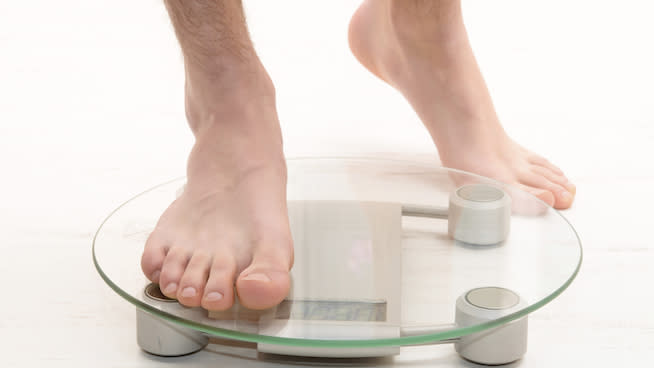How Undereating Can Make You Gain Weight

Photo: Thinkstock
Losing weight is challenging, and people who struggle with it often tell the same story: they increase their exercise and decrease their calories, only to be frustrated by a scale that doesn't change. They might even gain weight! What's the deal?
Undereating can slow down your metabolism and make you gain weight. You need calories to exercise, walk, eat, sleep, think, breathe, pump blood—the list goes on. If you don't take in enough calories to survive, your body will store food to protect itself. It will not let you burn off what you can't afford to lose, even during exercise.
RELATED: Health Benefits of Coffee For Athletes
Signs of a Low Metabolism
If your calorie intake is too low, it can effect your thyroid, which regulates hormone levels in the body. Hormones are responsible for regulating mood and appetite. If you are not getting hunger signals, it could be a sign that you have slowed your metabolism. You may also feel more irritable or depressed due to lack of fuel. It's a double-whammy: you may be starving or unhappy, and you're not losing weight. Cravings are also a sign of low energy. The body craves sugar when it is not nourished.
Instead of starving yourself, follow some of these easy guidelines to stay healthy while losing weight.
What You Can Do
Eat every 3 or 4 hours
Skipping meals frightens your body into thinking you are going to starve. Try to eat every 3 or 4 hours, alternating between meals and snacks. Set an alarm to help you remember.
Balance your meals
Include sources of fiber, healthy fats and protein whenever you can. Fiber makes you feel full without piling extra calories into your belly. Complex carbohydrates like brown rice and whole wheat bread also help you feel satiated longer. If you have to, plan your meals and snacks ahead of time to stay consistent.
Sleep well
Sleep affects metabolism. It is responsible for hormonal imbalance and can decrease the number of calories your body burns while resting. Develop a sleep routine by finding ways to relax to ensure you get adequate rest each night.
RELATED: Why Your School Should Let You Sleep In
Move often
Exercise stimulates metabolism when you move and packs on lean muscle, which increases your resting metabolism. The result? You burn slightly more calories even on days off.
Work with a professional
Your doctor or a registered dietitian can measure your resting metabolic rate and help you determine a plan that fits your individual needs.
References:
Saltzman, Edward and Robers, Susan. "The Role of Energy Expenditure in Energy Regulations: Findings from a Decade of Reasearch." Nutrition Reviews. August 1995.
Sharma, Sunil and Kavuru Mani. "Sleep and Metabolism: An Overview." International Journal of Endocrinology. April 2010.
This article originally appeared on STACK.com: How Undereating Can Make You Gain Weight

